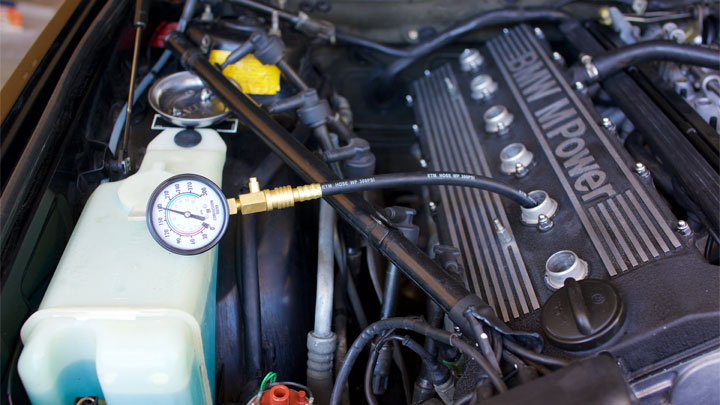
Causes of Low Compression in an Engine. If readings are very low in one cylinder it is highly probable that.
Beside this what causes no compression in an engine.
What causes an engine to lose compression. Compression loss is a result of a leak in one or more of the cylinders caused by normal engine wear and tear. If you experience compression loss in one cylinder of the engine it can cause misfiring and poor vehicle performance. There are several causes you can eliminate if your cylinders are losing compression.
One possibility is a blown head gasket. The head gasket connects to the cylinder head at the top of the engine. If there is a problem youll notice a gap between the cylinder and the head and gas will escape the cylinder leading to low compression.
If your engine runs too hot the heat could conceivably burn holes in the pistons which is another area for gas to leak out causing you to lose compression. More likely however is the scenario where the pistons themselves are intact but the piston rings were damaged from overheating and are failing to seal the gas inside the cylinder. The leak in the gasket allows gases to escape and leads to compression loss and poor engine performance.
The most common cause of head gasket failure is overheating. Extreme overheating leads to warping of the head or engine block which then. Causes of Low Compression in an Engine.
Low compression in an engine could be caused by a number of faults. Sometimes low compression is in only one cylinder and in other instances it is in a few or all cylinders. These are the common reasons behind low compression.
Well there are several potential causes. Below are seven of the most common causes of low engine compression. Each cylinder has a piston that moves up and down during the combustion cycle.
If the piston is damaged gasses can escape from the cylinder and cause low compression. Pistons can become damaged for several reasons. To make all of this happen.
The piston in your engine travels up and down in the cylinder to compress the air and fuel mixture at the top of the cylinder at the right time. If there is a failure with your piston it is not going to result in the correct compression of the air and fuel that is being mixed. Low compression will mean less ignition which will cause you misfires.
The following is a list of what may be causing your engine to lose compression. The Cylinder Wall may be Cracked. Also called the cylinder block usually cracks when there is excessive heat.
With the cylinder wall cracked the compression can be affected. Low Engine Compression In One Cylinder. If readings are very low in one cylinder it is highly probable that.
Internal engine damage exists such as. The piston could have a broken connecting rod or a hole in it. There could be a stuck burnt or leaking valve.
There could be a broken valve spring or a bent push rod. The most likely reason why a two-stroke engine has lost compression is an issue with the piston or piston rings. The piston is the part of the engine that creates the compression needed to run.
If there is a crack in the piston air can escape and cause a lack of compression. A thicker gasket will reduce the compression ratio by a small fraction probably only by 1 or 2. This is by far the easiest method of reducing compression but the risk is that you are more prone to head gasket failure and the gains in lower compression are minimal.
Decompression plates are essentially an extension to the head and can be very. For one thing your engine is a pressurized system. A mixture of fuel and air is combusted within this system using that pressure.
The result is the rotation of the crankshaft and any external parts attached to it such as the head on your trimmer. Signs that your engine may be losing compression are loss in power or trouble starting. Beside this what causes no compression in an engine.
A number of things can cause an engine to lose compression and just about all of them involve mechanical failure of some kindSo bent valves a hole in the top of the piston or broken piston rings can cause a loss of compression that can equate to a no-start conditionTo check for this run a compression test. The ensuing explosion drives the piston outward and causes the crankshaft to spin. A loss of compression may result when the pistons are worn the seals around your pistons are worn or a push rod has become bent or broken.
The Usual Causes of Low Compression in an ATV There are only a few things in an internal combustion engine that can lead to low compression in the cylinders. Unfortunately diagnosing which culprit is the cause of the low compression almost always requires disassembling the engine to some degree. The valvetrainthe components that work together to open and close the engines valvescan also cause a loss of compression due to low volumetric efficiency.
For example a worn camshaft lobe or broken rocker arm could limit the amount of air. The leak in the gasket allows gases to escape and leads to compression loss and poor engine performance. The most common cause of head gasket failure is overheating.
Extreme overheating leads to warping of the head or engine block which then results in a breakdown of the gasket seal. Sometimes the compression falls so low that the motor simply will not start. This symptom does not automatically mean that low compression is the culprit.
The problem could be something as simple as an empty gas tank or a spark plug wire that has become disconnected.
